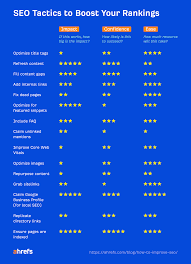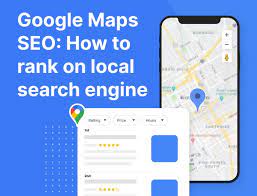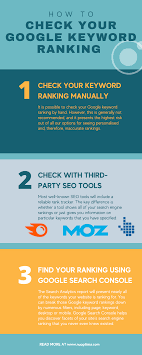Ways to Improve SEO
Search Engine Optimization (SEO) is crucial for increasing your website’s visibility and driving organic traffic. Here are some effective ways to improve your SEO:
Quality Content
Creating high-quality, relevant, and engaging content is essential for SEO success. Focus on producing valuable content that addresses the needs and interests of your target audience.
Keyword Research
Conduct thorough keyword research to identify relevant keywords and phrases that your target audience is searching for. Use these keywords strategically in your content, meta tags, and URLs.
On-Page Optimization
Optimize your website’s on-page elements, including title tags, meta descriptions, headings, and image alt text. Make sure your content is well-structured and easy to read.
Mobile-Friendly Design
Ensure that your website is mobile-friendly to provide a seamless user experience across all devices. Mobile optimization is crucial for both user satisfaction and search engine rankings.
Link Building
Build high-quality backlinks from reputable websites to improve your site’s authority and credibility in the eyes of search engines. Focus on earning natural backlinks through valuable content and outreach efforts.
Website Speed
Optimize your website’s loading speed to enhance user experience and improve search engine rankings. Compress images, minify CSS and JavaScript files, and leverage browser caching to speed up your site.
Regular Monitoring and Analysis
Monitor your website’s performance using tools like Google Analytics and Google Search Console. Analyze key metrics such as traffic sources, bounce rate, and keyword rankings to identify areas for improvement.
By implementing these strategies effectively, you can enhance your website’s SEO performance and attract more organic traffic from search engines.
Top 7 FAQs on Boosting Your SEO: Strategies and Best Practices
- What is SEO and why is it important?
- How can I improve my website’s SEO ranking?
- What role does content play in SEO?
- What are the best practices for keyword research?
- How do I optimize my website’s on-page elements for SEO?
- Why is mobile optimization important for SEO?
- What strategies can I use to build quality backlinks for SEO?
What is SEO and why is it important?
Search Engine Optimization (SEO) is the practice of optimizing your website to increase its visibility and ranking on search engine results pages. SEO is important because it helps your website attract organic traffic from users who are actively searching for information, products, or services related to your business. By implementing SEO best practices such as keyword optimization, quality content creation, and link building, you can improve your website’s chances of being discovered by potential customers and ultimately drive more traffic and conversions. In today’s competitive online landscape, SEO plays a crucial role in helping businesses stand out and succeed in the digital realm.
How can I improve my website’s SEO ranking?
Improving your website’s SEO ranking involves implementing various strategies to enhance your online visibility and attract more organic traffic. To boost your SEO performance, focus on creating high-quality, relevant content that resonates with your target audience and incorporates strategic keywords. Optimize your website’s on-page elements, such as title tags and meta descriptions, and ensure a mobile-friendly design for a seamless user experience. Building high-quality backlinks from reputable websites, optimizing your site’s loading speed, and regularly monitoring and analyzing key metrics are also crucial steps to improve your website’s SEO ranking effectively. By following these best practices consistently, you can increase your chances of ranking higher in search engine results pages and driving more traffic to your website.
What role does content play in SEO?
Content plays a critical role in SEO as it serves as the foundation for attracting and engaging both search engines and website visitors. High-quality, relevant content that is optimized with targeted keywords helps search engines understand the context and relevance of a website. Additionally, valuable content that addresses the needs and interests of the target audience can improve user experience, increase dwell time, and encourage sharing and linking – all factors that contribute to higher search engine rankings. In essence, content is not only king in SEO but also a powerful tool for establishing authority, driving organic traffic, and achieving long-term success online.
What are the best practices for keyword research?
Keyword research is a fundamental aspect of SEO strategy, and employing best practices can significantly impact your website’s visibility and ranking on search engines. To conduct effective keyword research, start by understanding your target audience and their search intent. Utilize keyword research tools to identify relevant keywords with high search volume and low competition. Focus on long-tail keywords that are specific to your niche and align with your content. Regularly analyze and update your keyword list to stay current with evolving search trends. Incorporating these best practices for keyword research can help optimize your content for better search engine visibility and drive organic traffic to your website.
How do I optimize my website’s on-page elements for SEO?
Optimizing your website’s on-page elements for SEO is crucial for improving your search engine rankings. Start by focusing on key elements such as title tags, meta descriptions, headings, and image alt text. Ensure that your title tags accurately reflect the content of each page and include relevant keywords. Write compelling meta descriptions that entice users to click through to your site from search engine results pages. Use headings (H1, H2, etc.) to structure your content logically and make it easier for both users and search engines to understand. Finally, optimize your image alt text with descriptive keywords to improve accessibility and help search engines understand the context of your images. By paying attention to these on-page elements and incorporating relevant keywords strategically, you can enhance your website’s SEO performance and attract more organic traffic.
Why is mobile optimization important for SEO?
Mobile optimization is crucial for SEO because of the increasing number of users accessing the internet through mobile devices. Search engines prioritize mobile-friendly websites in their rankings to provide a better user experience for mobile users. With more people using smartphones and tablets to browse the web, having a mobile-optimized website ensures that your content is easily accessible and readable on smaller screens. By optimizing your site for mobile, you can improve your SEO performance, increase user engagement, and ultimately drive more organic traffic to your website.
What strategies can I use to build quality backlinks for SEO?
Building quality backlinks is essential for improving SEO performance. One effective strategy to acquire high-quality backlinks is through creating valuable and engaging content that naturally attracts links from reputable websites in your industry. Additionally, reaching out to influencers or other website owners for collaboration opportunities can help you secure relevant backlinks. Guest posting on authoritative sites, participating in industry forums, and leveraging social media platforms are also effective ways to build quality backlinks that can boost your website’s authority and search engine rankings. Consistent effort in implementing these strategies can lead to a strong backlink profile that enhances your SEO efforts.




